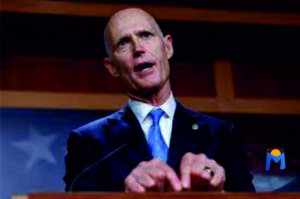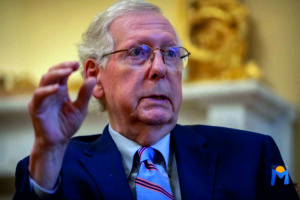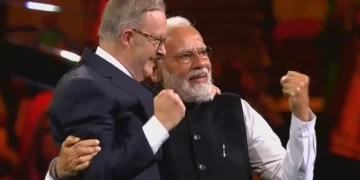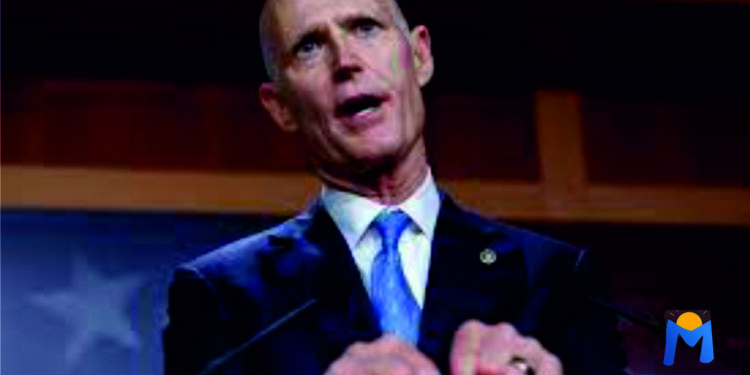Conservative GOP Senators Raise Concerns Over Bipartisan Ukraine-Border Deal
In Washington, a contentious battle over aid to Ukraine and strategies for addressing the southern border crisis has intensified. While lawmakers have grappled for months, conservative Republicans in the Senate are growing increasingly cautious about a bipartisan proposal aimed at tackling both issues simultaneously. This hesitancy is adding complexity to negotiations that are already navigating a political minefield.
During a press conference on Capitol Hill, some Senate Republicans, including Sen. Mike Lee of Utah, expressed reservations about the package, suggesting that it might not effectively enhance the president’s authority to curb migration to the U.S. According to reports, the yet-to-be-finalized deal seeks to make it more challenging for migrants to claim asylum, streamline the deportation process for those in the country illegally, expand detention capabilities, and increase Border Patrol staffing.
The proposed agreement also includes provisions to impose a cap on daily migrant entries, potentially restricting it to 5,000 migrants per day. However, senators such as Lee, Ted Cruz, Rick Scott, Roger Marshall, Mike Braun, Ron Johnson, and Eric Schmitt voiced concerns about this threshold, deeming it excessively high. They argued that setting such a limit could effectively establish migration at that level.
Moreover, the conservative senators asserted that the package faces formidable challenges in the House, where both right and left-wing members have expressed reservations. Sen. Rick Scott emphasized the importance of Republican unity across chambers, stating that Senate Republicans should not support anything that lacks backing from their counterparts in the House.

While it remains uncertain if the Senate-negotiated deal will pass the House, skepticism looms. House Speaker Mike Johnson has cast doubt on any compromise that deviates from the hardline border bill passed by House Republicans last year. Johnson contends that all elements of their bill, known as H.R. To effectively address the southern border, both bills must approve together in a comprehensive package.
The concerns raised by conservative senators preceded a lengthy private meeting among GOP senators. The gathering provided an opportunity for senators to articulate their positions on Ukraine funding and its connection to the border and immigration discourse. Despite the extensive deliberations, Sen. J.D. Vance indicated that the meeting did not significantly alter perspectives. The discussions largely revolved around American support for the war in Ukraine, including considerations of an “exit strategy” and the “depletion of reserves.”

Political Dynamics Heighten Border and Ukraine Aid Debate Among Senate Republicans
Senators on Capitol Hill are engaged in an ongoing debate over the border and Ukraine aid package, and this debate is not solely centered on policy. Some Republicans express concerns that supporting the package could grant President Joe Biden a victory on a contentious campaign issue, adding a layer of complexity to the discussions. Former President Donald Trump has also entered the fray, exerting pressure on congressional Republicans to reject the deal, raising apprehensions among senators about potential disruptions to delicate negotiations.
Election-year considerations have heightened the stakes, with some senators worried that Trump’s influence may jeopardize the intricate negotiations. Sen. Bill Cassidy of Louisiana emphasized the irresponsibility of undermining legislation for political purposes, highlighting the delicate balance between securing the border and political maneuvering.
Senate Majority Leader Mitch McConnell acknowledged the challenges posed by the intersection of Ukraine aid and border policy in a closed-door meeting, expressing concerns about undermining Trump’s position. As Trump continues to be a dominant figure in the 2024 GOP landscape, his allies in the Senate welcome his input on the emerging deal.

Sen. Rick Scott anticipates Trump’s involvement in shaping the deal, emphasizing the former president’s crucial role as a leader within the party. The debate reflects the broader dynamics within the GOP, with Trump’s opinions carrying significant weight.
Supporters of the deal argue that it presents a unique opportunity to achieve meaningful policy changes. The last major attempt to address border and immigration policy occurred in 2013, passing the Senate but failing to secure a vote in the House. Proponents contend that the proposed tools in the current deal would empower Trump, providing him with valuable resources to manage border challenges.
Sen. Thom Tillis, a vocal advocate for additional aid to Ukraine, stressed the significance of providing Trump with effective tools to address border issues. He highlighted that Trump had previously requested such tools during his presidency and emphasized the potential political difficulties in dealing with the issue now. Tillis warned against missing this opportunity, suggesting that the proposed measures could be instrumental in managing border-related challenges.










_after_crash_landing-360x180.jpg)

































